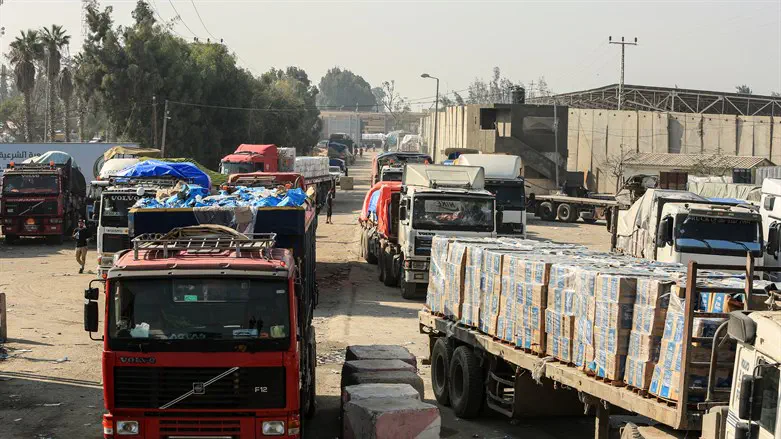
The Political-Security cabinet on Thursday night approved an increase of humanitarian aid to the Gaza Strip, the Prime Minister's Office said in a statement.
The statement said that the Cabinet authorized Prime Minister Benjamin Netanyahu, Defense Minister Yoav Gallant and Minister Benny Gantz to take immediate steps to increase humanitarian aid to the civilian population in the Gaza Strip.
"This increased aid will prevent a humanitarian crisis and is necessary to ensure the continuation of the fighting and to achieve the goals of the war," the Prime Minister's Office said.
"In light of this, Israel will allow the temporary delivery of humanitarian aid through Ashdod and the Erez Crossing and the increase of Jordanian aid through Kerem Shalom," it added.
In addition, the Prime Minister's Office said that the IDF is prepared for any development against Iran amid the repeated threats by senior Iranian officials to retaliate to the elimination of a senior Iranian Revolutionary Guards official in Damascus, in a strike attributed to Israel.
National Security Minister Itamar Ben Gvir’s office disputed the statement from the Prime Minister’s Office, saying in a statement of its own that "there was no vote this evening in the Cabinet on the authorization of Ministers Galant and Gantz on the increase of humanitarian aid to the Gaza Strip and the statement published on the issue on behalf of the Prime Minister's Office - is incorrect. Minister Ben Gabir and others opposed the proposal and it is to be regretted that the Prime Minister refrained from bringing it to a vote."
Ben Gvir added that "the right way to return our hostages is to stop bringing aid into Gaza, and to set a condition - humanitarian only in exchange for humanitarian. It's a shame that instead of entering Rafah, there are those who prefer to engage in bringing equipment into Gaza that ends up directly in the hands of Hamas. We must enter Rafah now!"
The Cabinet meeting took place hours after a phone call between Netanyahu and US President Joe Biden.
The White House said in a readout following Thursday’s call that Biden “made clear the need for Israel to announce and implement a series of specific, concrete, and measurable steps to address civilian harm, humanitarian suffering, and the safety of aid workers. He made clear that US policy with respect to Gaza will be determined by our assessment of Israel’s immediate action on these steps.”
"He underscored that an immediate ceasefire is essential to stabilize and improve the humanitarian situation and protect innocent civilians, and he urged the Prime Minister to empower his negotiators to conclude a deal without delay to bring the hostages home. The two leaders also discussed public Iranian threats against Israel and the Israeli people. President Biden made clear that the United States strongly supports Israel in the face of those threats," the White House statement concluded.
Two US officials who spoke to NBC News following the conversation said that Biden warned Netanyahu that the US could condition military aid to Israel on what it does to address humanitarian concerns in Gaza and get to a ceasefire as soon as possible.
“That was the message,” one of the officials said.
The two US officials said Biden told Netanyahu to begin letting more trucks carrying humanitarian aid into Gaza immediately and to be less stringent about what materials are on them.
Asked to elaborate on potential policy changes the White House hinted at in the readout, National Security Council spokesman John Kirby told reporters at a press briefing that he wouldn't preview specific steps that the US might take.
"What we are looking to see and hope to see here in the coming hours and days is a dramatic increase in the humanitarian assistance getting [into Gaza], additional crossings opened up and a reduction in the violence against civilians and certainly aid workers," Kirby said, according to NBC News, adding that they want to see Israel "take practical immediate steps to protect aid workers on the ground and to demonstrate that they have that civilian harm mitigation in place."

